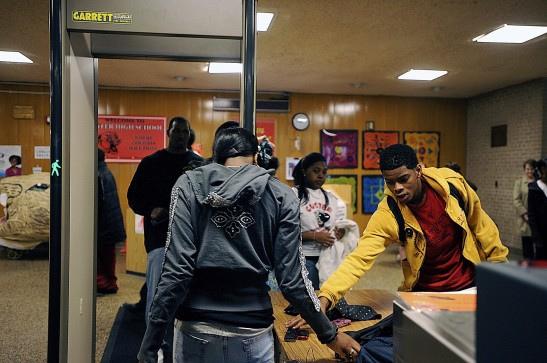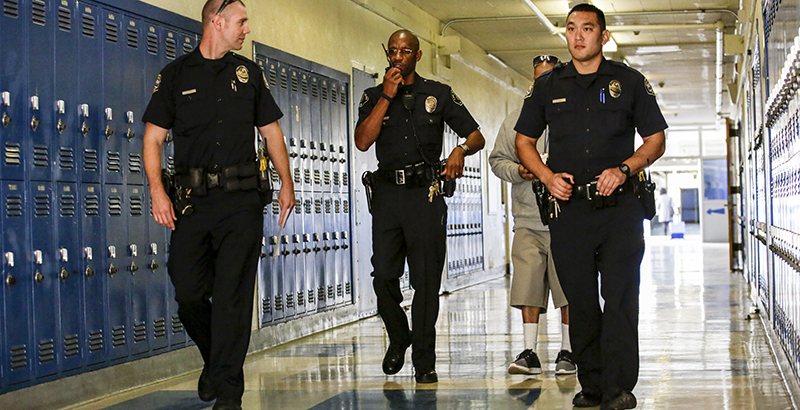In the Greater Chicago area, 12-year old Sam finally gets out of bed after snoozing his alarm for the third time. It is a brisk but pleasant fall morning. He rushes to get dressed and eat the meal his mother has already prepared for him. He complains to his mother that he doesn’t want to go to school today. She reminds him that no school would mean no basketball practice, and she knows he would never miss basketball practice. Sam sighs, grudgingly agrees and gets in his mother’s car. She drops him off at school every morning, even though his public school is only four blocks away in a safe neighborhood with a crime rate that is 93% lower than the national average. As she waves goodbye from the car window, Sam joins his friends in the hallway. They chatter excitedly about video games and sports until the bell rings and they head to their homerooms to listen to school announcements.
On the same morning in New Orleans, where the sun is hot, 10-year old Travis gets up for school early and helps get his younger siblings ready for the day. They prepare their usual breakfast of cereal and milk. Travis prepares his lunch. Travis’ mother has left them each a juice box to bring with them to school. She has been working two jobs ever since Travis’ father went back to jail. Travis will never forget seeing his father being taken away in handcuffs and his mother’s sobs that night. Although he may feel like he is, Travis is not alone; 94,000 other children across Louisiana have similar experiences due to the incarceration of a parent. Travis tears his mind away from his father and gathers his siblings. They start the trek to school, a K-8 charter school located a little over a mile away. Once Travis enters his school, he is met with security guards on both his left and right. Their waists are strapped with guns. Travis has seen his classmates be grabbed by security guards for being too loud in the hallway, so they don’t make him feel safe. Much of Travis’ predominantly black class would agree. In fact, while 77% of white students reported feeling safer around school security guards, just 54% of black students felt the same way.

Students going through security to enter their school for the day.
When his morning classes are over, Sam heads to the lunchroom. His stomach is rumbling and his mom has packed him his favorite lunch: a turkey and cheese sandwich, potato chips, and green grapes. Sam is so hungry; he takes his potato chips out of his lunch bag and starts eating them in the hallway. One of his teachers spots him and reminds him that food is for the lunchroom only. Sam had forgotten this rule. He faces no punishment though, especially after a new law aiming to limit punishments that take students out of the classroom went into effect in 2016 for his school district. He apologizes to the teacher and puts his potato chips back in his lunch bag until he enters the lunchroom. Sam joins his friends at a table where they talk over each other, trade food, and complain about the new math homework they have been assigned. When lunch is over, the students head outside for 5-minute recess. Sam and his friends race to the basketball court.
When Travis heads to lunch, he remembers the juice box his mother left him for this morning. He takes the juice box out of his pocket and pushes the straw through the hole. Just as he puts the straw to his mouth, a security guard barks at him. “No food in the hallway,” she yells, “come with me!” Travis is confused, so he resists. The security guard reaches down for her handcuffs. Travis flashes back to the night he saw his father in handcuffs being shoved into a police car. Travis always said he would never be like his father. But having an incarcerated parent already puts Travis at a higher risk of incarceration himself. He is scared. He runs from the security guard as she tries to handcuff him. Security guards chase Travis as he runs. They rip his backpack in the process, the backpack that his mother told him to be extra careful with because she worked really hard to get it. Travis cries as the security guard finally catches him and puts him in handcuffs. She tells him he is a little criminal. He sits in the principal’s office for the rest of the day and he, along with 28.8% of his fellow classmates across New Orleans that same year, is suspended.

Police armed with guns and handcuffs in schools.
Sam graduates from his middle school and heads on to high school. He plays basketball and graduates next to 96% of his classmates with a decent grade point average. He plans to go to the state college and study business. He credits his teachers and coaches for his success.
Travis, however, tries to keep to himself at school now after being tackled and handcuffed. He doesn’t want to end up in jail. He promised his mother that would never happen. He is scared to go to school. He suffers from anxiety attacks and flashbacks of being handcuffed on the ground. Sometimes he gets so anxious he cannot do his homework or answer questions in class. This is not all that shocking. When children are disciplined with physical abuse, they are five times more likely to live with post-traumatic stress disorder for the rest of their lifetimes. By the time Travis reaches high school, his grades are not good and he has fallen behind. He has experienced severe punishments for small misbehaviors throughout the years. In his junior year of high school, Travis drops out. And he isn’t the only one. Louisiana loses more than $6.9 billion per year in wages due to policies that force students out of school before graduation. If you ask Travis why he dropped out, he will tell you it is because he didn’t feel safe in school. In fact, he feels safer on the streets of New Orleans.
 Digital Civic Engagement Spring 2024: Water & Wellness in New Orleans: A health crisis overlooked: HIV/AIDS in New Orleans
Tye Collins outlines the history of HIV/AIDS in New Orleans, and how this issue has followed suit of former racialized inequalities to predispose people of color to contract these diseases.
Digital Civic Engagement Spring 2024: Water & Wellness in New Orleans: A health crisis overlooked: HIV/AIDS in New Orleans
Tye Collins outlines the history of HIV/AIDS in New Orleans, and how this issue has followed suit of former racialized inequalities to predispose people of color to contract these diseases.
 Water and Wellness in New Orleans: Ports, cocktails, and medicine
Brett McSherry explains how the medicine of 1841 combined with the use of the Port of New Orleans created the first cocktail. Sipping medicine has a whole new meaning now.
Water and Wellness in New Orleans: Ports, cocktails, and medicine
Brett McSherry explains how the medicine of 1841 combined with the use of the Port of New Orleans created the first cocktail. Sipping medicine has a whole new meaning now.
